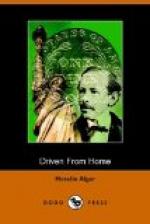“Thank Heaven, it was but a dream!” he murmured. “I must get up and try once more to open the box.”
The keys had all been tried, and had proved not to fit. Mr. Stark was equal to the emergency. He took from his pocket a button hook and bent it so as to make a pick, and after a little experimenting succeeded in turning the lock. He lifted the lid eagerly, and with distended eyes prepared to gloat upon the stolen bonds. But over his face there came a startling change. The ashy blue hue of disappointment succeeded the glowing, hopeful look. He snatched at one of the folded slips of paper and opened it. Alas! it was valueless, mere waste paper. He sank into a chair in a limp, hopeless posture, quite overwhelmed. Then he sprang up suddenly, and his expression changed to one of fury and menace.
“If Julius Gibbon has played this trick upon me,” he said, between his set teeth, “he shall repent it—bitterly!”
CHAPTER XXVI.
A disagreeable surprise.
Philip Stark sat down to breakfast in a savage frame of mind. He wanted to be revenged upon Gibbon, whom he suspected of having deceived him by opening and appropriating the bonds, and then arranged to have him carry off the box filled with waste paper.
He sat at the table but five minutes, for he had little or no appetite.
From the breakfast room he went out on the piazza, and with corrugated brows smoked a cigar, but it failed to have the usual soothing effect.
If he had known the truth he would have left Milford without delay, but he was far from suspecting that the deception practiced upon him had been arranged by the man whom he wanted to rob. While there seemed little inducement for him to stay in Milford, he was determined to seek the bookkeeper, and ascertain whether, as he suspected, his confederate had in his possession the bonds which he had been scheming for. If so, he would compel him by threats to disgorge the larger portion, and then leave town at once.
But the problem was, how to see him. He felt that it would be venturesome to go round to the factory, as by this time the loss might have been discovered. If only the box had been left, the discovery might be deferred. Then a bright idea occurred to him. He must get the box out of his own possession, as its discovery would compromise him. Why could he not arrange to leave it somewhere on the premises of his confederate?
He resolved upon the instant to carry out the idea. He went up to his room, wrapped the tin box in a paper, and walked round to the house of the bookkeeper. The coast seemed to be clear, as he supposed it would be. He slipped into the yard, and swiftly entered an outhouse. There was a large wooden chest, or box, which had once been used to store grain. Stark lifted the cover, dropped the box inside, and then, with a feeling of relief, walked out of the yard. But he had been observed. Mrs. Gibbon chanced to be looking out of a side window and saw him. She recognized him as the stranger who had been in the habit of spending recent evenings with her husband.




